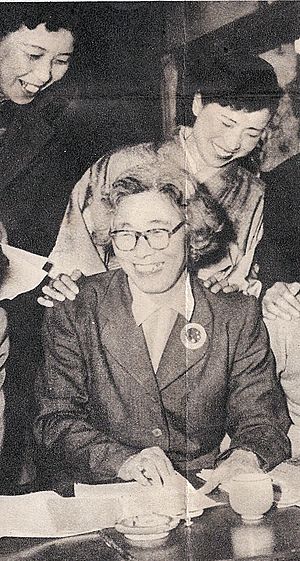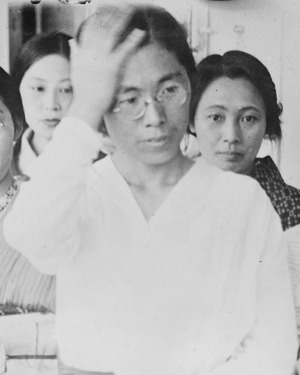Ichikawa Fusae facts for kids
Ichikawa Fusae (市川 房枝, May 15, 1893 – February 11, 1981) was an important Japanese leader. She fought for women's rights, especially for women to have the right to vote. Her hard work helped women in Japan get the right to vote in 1945. She was also a politician.
Early Life
Born in Bisai, Aichi Prefecture, Japan, in 1893, Ichikawa Fusae was taught the importance of education. She studied to become a primary school teacher. When she moved to Tokyo in the 1910s, she learned about the women's movement. In 1917, she became the first woman reporter for the Nagoya Newspaper. In 1920, she helped start the New Women's Association (Shin-fujin kyokai) with another famous Japanese feminist, Hiratsuka Raicho.
Fighting for Women's Vote
The New Women's Association was the first group in Japan created to improve women's lives. Under Ichikawa's leadership, the group worked to change Japanese laws. These laws stopped women from taking part in politics. Since women were not allowed to campaign, the group held "lecture meetings" to share their ideas. The law was changed by the Imperial Diet in 1922, and then the association closed.
Two years later, Ichikawa went to the United States. She wanted to meet American women's suffrage leader Alice Paul. In 1924, she returned to Japan. She then started Japan's first women's suffrage group. It was called the Women's Suffrage League of Japan (Nippon fujin yûkensha dômei). In 1930, this group held Japan's first national meeting about women getting the right to vote. Ichikawa worked closely with Shigeri Yamataka, who later became a politician.
After World War II, Ichikawa played a big role in making sure women's right to vote was included in Japan's new constitution. She believed that if women had been able to vote, Japan might not have entered such a destructive war. The New Japan Women's League was formed to help women get the vote, and Ichikawa was its first president.
Thanks to Ichikawa's efforts and the rules of the Potsdam Declaration, women in Japan gained full voting rights in November 1945.
Other Important Work
Ichikawa also worked to stop corruption in elections. This led to the 1933 Women's Association to Clean Tokyo Politics. She was also appointed as one of five women leaders in a government office called the Central Association to Clean Up Elections.
During World War II, she helped organize groups that supported the war effort. She also served as a leader in the Great Japan Women's Association. This group helped coordinate private support organizations.
Ichikawa was always a strong supporter of women's issues. She organized and took part in women's meetings both in Japan and around the world. In 1980, she was a main voice urging the Japanese government to sign an important agreement. This agreement was called the Convention on the Elimination of All Forms of Discrimination against Women. It aimed to stop all forms of unfair treatment against women.
Political Career
After World War II, Ichikawa was at first not allowed to hold political jobs by the occupation forces. She returned to politics after the occupation ended. In 1953, she was elected to the Diet (Japan's parliament) as a representative for Tokyo. She continued to focus on issues important to women. She also worked on making elections fairer. She was re-elected twice, but then lost her next election in 1971.
However, in 1974, when she was 81 years old, Ichikawa was asked to run again. She won and served a fourth term in the Diet. In 1980, she was re-elected to the House of Councillors. She received the most votes from across the country.
Awards
In 1974, Ichikawa received the Ramon Magsaysay Award for Community Leadership. This award recognized her hard work in supporting social equality for everyone.
See also
 In Spanish: Fusae Ichikawa para niños
In Spanish: Fusae Ichikawa para niños
 | William Lucy |
 | Charles Hayes |
 | Cleveland Robinson |



